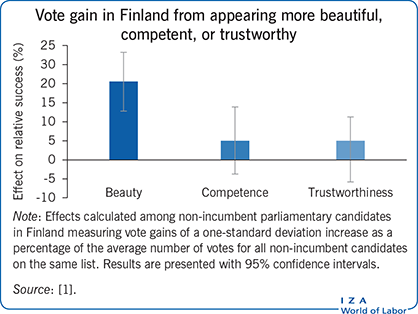Elevator pitch
Good-looking political candidates win more votes around the world. This holds for both male and female candidates. Candidate appearance may be especially important for uninformed voters, as it is easy to observe. Voters may favor good-looking candidates because they expect them to be more competent or persuasive, but it can also be that voters simply enjoy laying their eyes on beautiful politicians. As politicians on the right have been deemed more attractive in Europe, the US, and Australia, the importance of beauty in politics favors conservative parties. A related finding is that voters use beauty as a cue for conservatism.
Key findings
Pros
Candidate appearance is easily available for uninformed voters.
There is no gender difference in how voters reward beauty of male and female candidates; therefore, there is no evidence on gender discrimination in terms of how beauty is rewarded.
Voters can, to a certain extent, infer candidate ideology from appearance by using beauty as a cue for conservatism.
Even if well-informed voters do not rely on beauty to guide their voting behavior, less informed voters can and do draw inferences about ideology from it.
Cons
The beauty premium may discourage competent but unattractive people from entering politics.
Uninformed voters can be persuaded by good looks, and may, as a result, vote against their own interests.
Empirical results do not imply that political parties should replace their less photogenic established politicians with good-looking novices to maximize their electoral success.
Voters associate beauty with competence, so even the choice of voters who think that they vote for the more competent-looking candidate may be driven by beauty differences.
